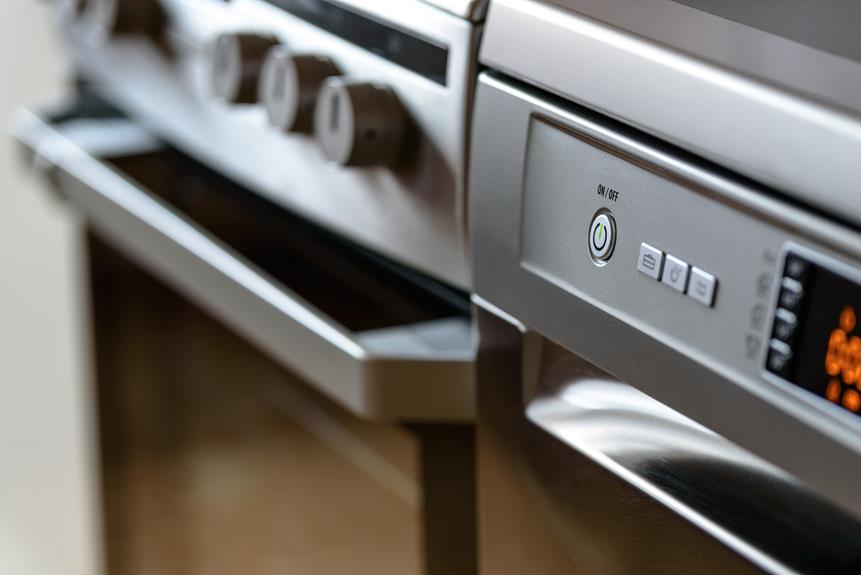Class Action Lawsuit Looms Over Dishwasher Leaks
An escalating issue with certain Whirlpool, Maytag, and KitchenAid dishwashers is causing alarm among consumers. Reports suggest these appliances harbor a heating element defect, leading to significant water leaks and property damage. The situation's severity has prompted potential legal action, with a class action lawsuit looming. This article explores the potential lawsuit, affected models, compensation paths, and steps for consumers, possibly leading to a manufacturer recall.

Investigation Into Potential Lawsuit
In our investigation into the potential lawsuit, it has been found that owners of Whirlpool, KitchenAid, and Maytag dishwashers are being scrutinized for leaks allegedly caused by a heating element defect. This defect has led to substantial property damage, raising a red flag for consumer rights. The extent of the damage necessitates potential legal action, with attorneys considering a class action lawsuit as a viable solution. A class action lawsuit would serve dual purposes: providing compensation for affected consumers and pressing the manufacturers to address the defect. Understanding the gravity of the situation, consumers who have experienced leaks or received a letter notifying them of a free upgrade are encouraged to fill out a form, thereby aiding the initiation of the lawsuit.
Affected Dishwasher Models
While the potential lawsuit encompasses a broad range of consumers, it specifically targets owners of certain Whirlpool, Maytag, and KitchenAid dishwasher models, with distinct serial numbers indicating their eligibility for a free upgrade. The Whirlpool lawsuit seeks to address this issue, as consumers have reported significant property damage due to leaks caused by a heating element defect. Those affected are being urged to check their appliance's serial number against a specified list to determine their eligibility for the upgrade. This legal action, if successful, could lead to KitchenAid compensation for damages and a formal recall of the faulty units. As the investigation continues, it is crucial for consumers to be vigilant and proactive in checking their appliances' status.
Identifying the Serial Numbers
Understanding how to identify the serial numbers on the potentially affected dishwashers is a crucial step for consumers in determining their eligibility for the free upgrade and potential involvement in the class action lawsuit. Finding the serial numbers can be done by following Whirlpool's advice and Maytag's suggestion. Whirlpool advises consumers to look for the serial number on the inner rim of the dishwasher. Similarly, Maytag suggests that the serial number can be found either in the upper left corner or the underside of the control panel. Identifying these numbers is essential for consumers to ascertain whether their dishwasher is among those potentially affected by the defect, thereby allowing them to participate in any possible legal recourse.
The Heating Element Defect
The defect in the heating element system, specifically the failure of the brass bushings and rubber seals to properly seal off water, is the focal point of the ongoing investigation and the potential class action lawsuit. The heating element investigation seeks to determine whether this defect is a common issue across the affected dishwasher models, leading to significant leaks and subsequent property damage. Leaking water can severely damage flooring, cabinets, and other property, often necessitating costly repairs. It has been reported that some owners suffered such considerable damage, warranting appliance damage compensation. If the class action lawsuit succeeds, it could ensure that the individuals affected by this heating element defect receive due compensation for their appliance and property damage.
Damage From Leaks
Although the primary concern is the malfunctioning heating element in the dishwashers, the consequent water leaks have led to significant property damage, intensifying the urgency of the situation. The causes of leaks are closely linked to the defective heating element and its failure to seal off water correctly.
- Impact on consumers:
- Physical Damage: Consumers have reported substantial damage to flooring, cabinets, and other property, escalating the costs of this defect.
- Emotional Stress: The uncertainty surrounding the extent of potential future leaks adds undue stress to affected individuals.
- Financial Burden: The extra costs associated with repair or replacement and property restoration have created an unexpected financial burden for consumers, heightening the need for a resolution.
Consumers' Reported Damages
While the aforementioned issues have already imposed significant financial burdens and emotional stress on consumers, the reports of specific damages due to the dishwasher leaks further highlight the dire need for a resolution. Scenarios include extensive water damage to wooden flooring, kitchen cupboards, and other properties. These incidents have escalated the urgency for a potential lawsuit resolution. Moreover, frustrations are mounting over delays in repair services due to backordered parts. Many are hoping that a class action lawsuit would provide the necessary consumer compensation options. As we delve further into these reported damages, it becomes clear that the potential lawsuit resolution isn't just a demand for compensation, but also a call for overall improved product quality and customer service.
Delayed Repair Issues
In the midst of these reported damages, delays in repair services due to backordered parts have further exacerbated the situation for affected dishwasher owners. This delayed repair process has been a source of significant consumer frustration.
The issues can be categorized as follows:
- *Parts Availability*: A shortage of necessary components has contributed to the delay in repairs, causing further inconvenience to consumers.
- *Scheduling Difficulties*: Consumers are facing challenges in arranging suitable times for the repairs. This often leads to extended periods of appliance downtime.
- *Inconsistent Communication*: There are reports of unclear or inconsistent communication from the manufacturer or their authorized repair service providers, exacerbating the consumer angst and dissatisfaction.
All these factors collectively compound the negative impact of the dishwasher leaks on affected owners.
Severity of Heating Element Corrosion
Investigations into the dishwasher leaks have revealed severe corrosion of the heating elements, exacerbating the leak issue and potentially increasing property damage. The corrosion, in some instances, was so severe that the heating element had completely disintegrated, leading to catastrophic leaks. The severity of property damage has ranged from minor water seepage to extensive destruction of flooring and cabinetry. As a result, many consumers are now exploring compensation options. If a class action lawsuit is successful, consumers may receive compensation for their damaged properties and the defective product. However, the payout will depend on the extent of the damage and the terms of the settlement. Ultimately, the severity of heating element corrosion is a significant factor in the pending litigation.
Inadequacy of Consumer Communication
Addressing the issue of consumer communication, many dishwasher owners have voiced concerns over the inadequacy of the manufacturer's notifications regarding the potential heating element defect and its consequences. This inadequacy has led to:
- Consumer frustration:
- Misinformation or lack of clear instructions exacerbating the issue.
- Dissatisfaction with the manufacturer's response.
- Consequences of poor communication:
- Further damage due to unawareness of the defect.
- Increased financial burden on consumers.
- Legal implications:
- Potential class action lawsuit due to the manufacturer's failure to properly communicate risks.
- Demand for compensation due to property damage caused by the defect.
The situation demands an urgent improvement in consumer communication to prevent further problems and legal complications.
Concerns Over Continued Leaks
Numerous dishwasher owners have expressed increasing worry over the persistent leaks, even after receiving the suggested upgrade, signaling a potential ongoing issue with the appliance's heating element. These concerns highlight a consistent problem that may lead to potential legal action.
| Concern | Implication | Outcome |
|---|---|---|
| Persistent leaks | Damage to property and potential health risks | Increased costs for owners |
| Delay in resolution | Continued inconvenience and potential damage | Consumer dissatisfaction |
| Potential legal action | Class action lawsuit | Possible consumer compensation |
This scenario underscores the need for satisfactory resolution, not just temporary fixes. Consumer compensation could help alleviate the financial burdens imposed by this issue. Moreover, a class action lawsuit may serve as a catalyst to ensure effective and long-lasting solutions are implemented.
Benefits of Class Action Lawsuit
Initiating a class action lawsuit against Whirlpool, Maytag, and KitchenAid could potentially offer a range of benefits to the affected dishwasher owners, coming as a direct response to the persistent leakage issues and associated concerns.
These benefits include:
- Protection of Consumer Rights: This potential lawsuit could serve as a deterrent, prompting manufacturers to prioritize customer safety and satisfaction.
- Compensation: Affected individuals could receive compensation for their damages, reducing the financial burden faced.
- Cost Effectiveness: Class actions distribute the costs among many people, making it affordable for individuals to litigate their claims.
Possible Compensation Paths
One potential avenue for consumers affected by this dishwasher defect is to seek compensation through a class action lawsuit. This form of potential legal action will allow a large group of people to collectively bring a claim to court. The compensation options can range from refunds for the faulty product to damages for any property harm caused by the leakage.
| Potential Legal Action | Expected Compensation | Possible Timeline |
|---|---|---|
| Class Action Lawsuit | Refund or Replacement | 1-2 years |
| Individual Lawsuit | Damages + Replacement | 2-3 years |
| Settlement | Negotiated Amount | 6 months-1 year |
| Manufacturer Recall | Product Replacement | Immediate |
| Insurance Claim | Damages | Depends on policy |
This table summarizes the possible paths for compensation, their expected outcomes, and the potential timelines involved.
Potential for Manufacturer Recall
In the event of a successful class action lawsuit, it's possible that the manufacturers—Whirlpool, Maytag, and KitchenAid—could be compelled to issue a recall for the affected dishwasher models. This could serve as a significant instance of manufacturer accountability, underlining the importance of consumer rights.
- Recall implications:
- Replacement or repair of faulty dishwashers.
- Potential reimbursement for damages incurred due to leaks.
- Manufacturer accountability:
- Ensuring quality control and safety standards.
- Addressing and rectifying product defects promptly.
- Upholding consumer rights:
- Ensuring consumers receive products that function as advertised.
- Providing swift resolution to product issues, including recalls if necessary.
This scenario illustrates the potential power of class action lawsuits to uphold consumer rights and ensure manufacturer accountability.
Free Legal Consultation Options
For dishwasher owners affected by the heating element defect, obtaining a free legal consultation could provide essential insights into potential compensation claims and participation in the proposed class action lawsuit. Availing of free legal advice can help you understand and exercise your consumer rights. These consultations can be accessed through various law firms and consumer advisory services offering pro bono services. Most provide guidance on how to proceed with a case, potential outcomes, and advice on gathering evidences. Remember, it is crucial to understand your rights as a consumer in cases like this. Moreover, a free consultation does not obligate you to hire the lawyer, but it can provide a clearer picture of what your legal journey might entail.
Next Steps for Affected Consumers
The first course of action for affected consumers should be to identify whether their dishwasher model and serial number falls within the range specified for the potential defect. Key steps include:
- Identification: Verify the model and serial number of your dishwasher. If it matches those mentioned in the lawsuit, you're potentially affected.
- Documentation: Keep a record of all damage and repair costs. This will be crucial for the lawsuit.
- Legal Action: Consult with a lawyer to understand your consumer rights and options. Consider joining the class action lawsuit.
These next steps for legal action are crucial in ensuring your rights as a consumer are protected and you receive fair compensation for any damages incurred due to the defect.
Frequently Asked Questions
What Should I Do if I Am Unsure Whether My Dishwasher Model Is Among Those Potentially Affected by the Heating Element Defect?"
If you suspect your dishwasher model may be affected by the heating element defect, verify the appliance's model and serial number, typically located in the positions detailed above. Cross check these details with the potentially affected models. If still in doubt, contact your manufacturer's customer service for clarification. Review your warranty coverage for potential dishwasher replacement or repair services. If your dishwasher is leaking, immediate action is recommended to prevent further damage.
How Can I Determine if the Issues I Am Experiencing With My Dishwasher Are Due to the Suspected Heating Element Defect?"
To determine if your dishwasher's issues are due to the suspected heating element defect, observe for common signs. These include persistent leaks, particularly at the base. Dishwasher maintenance tips advise checking for corrosion or wear on the heating element. Troubleshooting leaks may involve inspecting the brass bushings and rubber seals. If these parts appear damaged or worn, it's likely the heating element is the source of your problem. Consult a professional for a definitive diagnosis.
Could There Be Other Reasons for My Dishwasher Leaking, Other Than the Suspected Heating Element Defect?"
Yes, there could be other reasons for your dishwasher leaking apart from the suspected heating element defect. Leak prevention tips include regular maintenance checkups, ensuring proper installation, checking the door gasket for wear and tear, and verifying correct loading of dishes. Refer to your dishwasher maintenance guide for further information. However, if problems persist, professional advice should be sought to prevent potential water damage to your property.
What Happens if I Decide Not to Participate in the Potential Class Action Lawsuit as an Affected Consumer?"
If you decide not to participate in the potential class action lawsuit, you retain your rights to pursue individual legal action. This is referred to as a 'lawsuit opt out'. By opting out, you maintain the ability to file a personal lawsuit against the manufacturer, potentially seeking damages for your specific circumstances. However, you will not be entitled to any compensation awarded in the class action, unless you formally rejoin the proceedings.
Are There Other Legal Recourse Options Available to Me Aside From a Class Action Lawsuit?"
Yes, aside from a class action lawsuit, affected consumers have other legal recourse options for dishwasher leaks. One option is to pursue warranty claims if the product is still under warranty. Additionally, consumers can file a product liability lawsuit, which alleges that a product was designed, manufactured, or marketed in a way that caused harm. It's advisable to consult with a legal professional to explore these alternatives based on the specifics of your situation.

This post has been generated by AI and was not reviewed by editors. This is Not legal advice. Please consult with an attorney.




